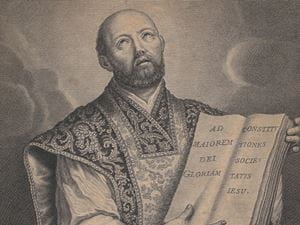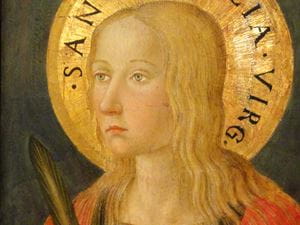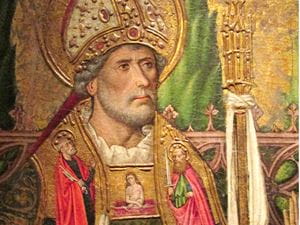Chastity has historically been a cornerstone of Christian faith and devotion. It’s appropriate that some of the most celebrated figures in the Christian faith went to great lengths to maintain their faith in the face of lust, sin, and immorality. Since many of the ancient saints have ambiguous historical origins, much of what they purportedly did or didn’t do must be taken on faith as well. Nevertheless, whether historically accurate or not, stories of Christian saints have been passed down over generations. Within these stories, men and women risk life and limb to stay celibate and remain dedicated to God.
St. Benedict

St. Benedict is best known for his strict rules governing the lives of monks who became a part of the order he founded, the Benedictines. Pope Gregory wrote a biography recounting the painful manner in which Benedict once overcame lust when tempted by the memory of a woman he’d seen. Pope Gregory wrote that St. Benedict took off his clothes and threw himself into the thick briers and nettle bushes. Pope Gregory adds that Benedict stayed there so long that all of his flesh was pitifully torn when he got up. Sometime after that event, Benedict told his disciples that he was never tempted by lust again by exchanging these two fires.
St. Agatha

St. Agatha was a young and eligible maiden raised by a prominent family in Sicily. Numerous suitors surrounded her, with some intent on carnally despoiling her. Uninterested in this attention, she dedicated her virginity to God. One of her rejected suitors, a Roman captain named Quintianus, decided to persecute Agatha for her Christian faith and force her to give in to his desires. He ordered her to give up her faith, and when she refused, he imprisoned her in a brothel. When the brothel didn’t change Agatha’s resolve, she was taken back to Quintianus, who imprisoned her in jail, where she was tortured horribly, including having her breasts amputated. After refusing to submit in the face of repeated assault, her spiritual devotion was punished with a sentence of death. St. Agatha is the patron saint of breast cancer patients and torture victims.
St. Agnes

St. Ignatius

St. Ignatius was born in Loyola, Spain, in the late 15th century. Initially, a soldier of the Spanish king, Ignatius’s luck took a sharp turn when he was severely hurt while defending Pamplona. During his recovery, he spent hours reading spiritual books and came close to dying, a process that caused him to experience a religious conversion. When he recovered, he decided to enter a monastery, took a vow of poverty, and renounced his former, worldly, aggressive way of life. With a group of like-minded monks, he established the ascetic and strict order known as the Society of Jesus or Jesuits, as society would eventually call them. The spiritual exercises he developed while in convalescence became a central mechanism for abstaining from temptations. Because of his scholarship and the Jesuit dedication to educating others, Ignatius is the patron saint of education.
St. Lucy

St. Lucy was a late third-century Italian maiden who likely perished as a martyr during an era of Christian persecution. However, there are stories about her life that reveal her virtues. In one, she vowed to remain chaste despite a marriage her mother tried to arrange between Lucy and a non-Christian. After Lucy prayed for help, she had a vision of St. Agatha in a dream that convinced her to disregard the marriage and give her dowry to the poor. Lucy’s rejected suitor sent guards to force her to the brothel, but Lucy wouldn’t budge, not even with a team of oxen pulling her. In another story, Lucy’s oppressors removed her eyes as punishment. However, when she was buried, her eyes were miraculously restored. St. Lucy is recognized as the patron saint of the blind because she put out her eyes to discourage her suitors.
St. Cecilia

St. Cecilia was a Roman noblewoman from the second or third century CE. According to legend, she was married off by her wealthy family to a non-believer named Valerian despite her vow of virginity. However, when her husband tried to consummate the marriage, Cecilia told him that an angel watched over her and would punish Valerian if he insisted on violating her. When her husband requested to see the angel, she suggested getting baptized. Upon his baptism, Valerian converted to Christianity and was later slain as a martyr. Cecilia is regarded as the patron saint of music as it’s believed she heard music in her heart during her wedding.
St. Augustine

All of these saints went through the wringer to remain pure. Their dedication is a shining example of how Christians worldwide should act to follow God’s Word. Admittedly, their choices may have been a little extreme, but their dedication is still admirable. God is so good, and his love is so immense that as his children, the least we can do is follow Him and show Him the respect He deserves.
